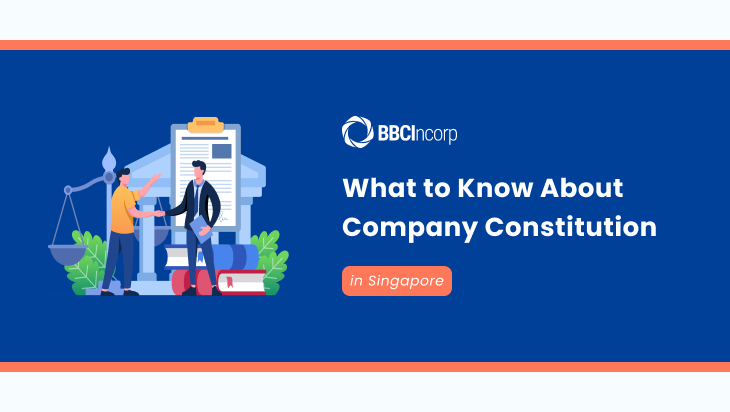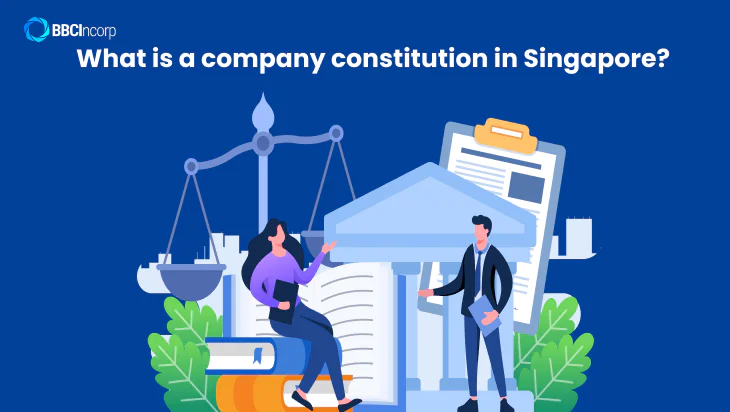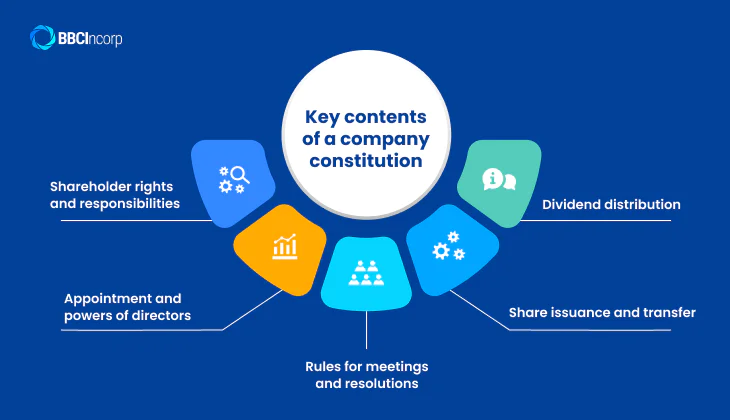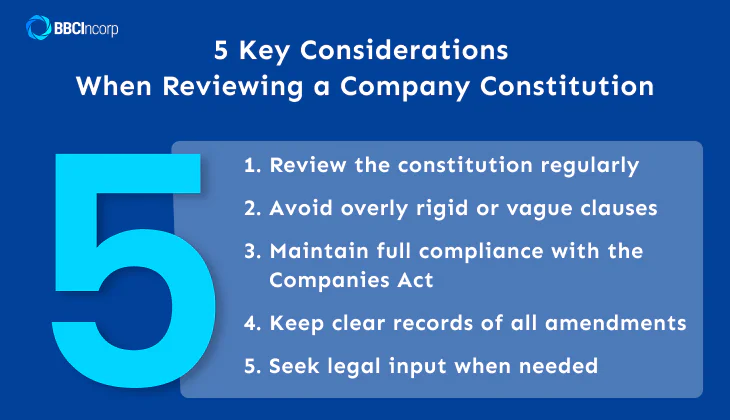
- What is a company constitution in Singapore?
- ACRA model constitution: What it includes and when to use it
- Custom company constitution vs ACRA model
- How to change the constitution of a company in Singapore
- When is a company constitution required and why it matters
- 5 Key Considerations When Drafting or Reviewing a Company Constitution
- Common mistakes and how to avoid them
- Ensure a compliant company constitution with BBCIncorp
- Conclusion
Every company in Singapore begins with a legal foundation, and that foundation is the company constitution. Required under the Companies Act 1967, the company constitution in Singapore defines the internal rules that govern how a company is managed and operated. It is a mandatory document during incorporation and remains essential for guiding corporate governance over time.
From setting out the powers of directors to outlining the rights of shareholders, the constitution helps ensure transparency, accountability, and consistency. In this article, we will provide a clear understanding of this document and compliance tips for any Singapore business.
What is a company constitution in Singapore?
A company constitution in Singapore is a legal document that outlines the rules for how a company is governed. It defines the relationship between the company, its shareholders, and its directors, and is a mandatory requirement under the Companies Act, Cap. 50. This document is essential not only at incorporation but also throughout the life of the company.

From M&AA to the company constitution
Before July 1, 2015, companies in Singapore used two documents to define their internal structure: the Memorandum of Association and the Articles of Association. These were commonly referred to as the Articles of Association of Singapore.
Following amendments to the Companies Act, new companies are now required to adopt a single document known as the company constitution. Companies incorporated before this change may retain their existing M&AA, but adopting a modern constitution helps streamline governance and align with current legal standards.
Legal role and enforceability
The company constitution in Singapore serves as a binding contract between the company, its shareholders, and its officers. It governs key aspects such as decision-making procedures, director authority, shareholder rights, and dispute resolution. Setting clear expectations and responsibilities provides a foundation for transparency and accountability.
Key contents of a company constitution
Most constitutions in Singapore cover these core areas:
Shareholder rights and responsibilities
The constitution outlines rights such as voting at general meetings, receiving dividends, and accessing company information. It also establishes the responsibilities shareholders must observe under the law and the constitution.
Appointment and powers of directors
It details how directors are appointed or removed, defines their authority in managing the company, and sets limits on their actions where required.
Rules for meetings and resolutions
Procedures for calling and conducting general and board meetings are specified, along with requirements for quorum, voting thresholds, and notice periods.
Share issuance and transfer
The constitution describes how shares can be issued, transferred, or sold, including conditions for approval and any restrictions on transferability.
Dividend distribution
It sets out the basis and process for declaring and paying dividends, ensuring consistency of information with company profits and legal requirements.

Understanding what a company constitution is and how it functions is essential for any company owner. It not only underpins corporate governance but also supports long-term compliance and clarity from the moment the certificate of incorporation in Singapore is issued.
ACRA model constitution: What it includes and when to use it
When incorporating a company in Singapore, business owners are given the option to adopt the ACRA model constitution. This is a standardised version of the company constitution in Singapore, designed by the Accounting and Corporate Regulatory Authority (ACRA) to simplify and speed up the incorporation process. It is readily available during the ACRA company incorporation process through BizFile and can also be downloaded directly from ACRA’s website.
What does the ACRA model constitution include?
The ACRA model constitution is available in two versions—one for private companies limited by shares, and another for companies limited by guarantee. It combines key governance clauses into a single document, replacing the older format of Memorandum and Articles of Association.
The main sections typically cover:
Share capital
The share capital outlines the organization of issued shares, the rights attached to each class of shares, and procedures for increasing capital or issuing new shares.
Shareholder rights
These rights include provisions for voting rights, dividend entitlements, and procedures for transferring or buying back shares.
Directors’ powers and duties
The model sets out how directors are appointed or removed, their decision-making authority, responsibilities in managing company affairs, and how board meetings should be conducted.
Why use the ACRA model constitution?
The main advantage of the ACRA model constitution is its convenience. It is pre-approved by ACRA, legally compliant, and structured to meet the needs of a private limited company in Singapore. For small to medium-sized businesses, especially those with clear ownership and governance structures, it offers a time-saving and cost-effective solution at the point of incorporation.
By using the model, companies can avoid the cost of drafting a custom constitution from scratch, and proceed smoothly through the ACRA company incorporation process via BizFile.
When should you consider other options?
Although the ACRA model constitution suits many businesses, it may not have the level of flexibility needed for companies with more complex governance needs. For example, businesses with multiple classes of shares, unique voting rights, or detailed decision-making models may prefer to customize their constitution to better reflect internal agreements and shareholder expectations.
In such cases, consulting a corporate service provider or legal advisor is recommended. However, for most startups and SMEs, the ACRA model constitution remains a practical and fully compliant starting point for establishing a company constitution in Singapore.
Custom company constitution vs ACRA model
Choosing between the ACRA model constitution and a custom company constitution depends on the nature and complexity of your business. The ACRA model constitution suits many startups and small enterprises with straightforward structures. For companies with more specific governance needs, a custom document may be more appropriate.
When to consider a custom constitution
A custom company constitution is necessary for businesses with complex ownership structures, such as multiple shareholder classes or special voting rights. It allows companies to define terms that reflect their unique arrangements, including dividend rights, decision-making powers, and succession plans.
Companies operating in regulated sectors may also need to include clauses that meet sector-specific compliance requirements. In such cases, adopting a private company constitution in Singapore tailored to those obligations helps prevent future complications.
Risks of choosing the wrong structure
A constitution that does not match your business needs can lead to challenges. Generic clauses may limit flexibility in decision-making or restrict the company’s ability to bring in new investors. As a business evolves, these limitations can slow growth and complicate internal governance.
Misalignment between the constitution and the company’s actual operations may also lead to legal disputes. For instance, if shareholder rights or director responsibilities are not clearly outlined, conflicts can arise. Any required change in the constitution of the company later may involve shareholder resolutions, legal costs, and regulatory procedures.
Making the right choice
For companies with simple ownership and governance, the model constitution provides a compliant and cost-effective foundation. Businesses planning for growth, investment, or specialised structures benefit from drafting a constitution that reflects their long-term strategy.
Although both approaches establish a legally sound foundation for a company constitution in Singapore, opting for the more appropriate one eases operations, and mitigates potential risks as the company evolves.
How to change the constitution of a company in Singapore
Companies often revise their constitutions as their operations expand or internal shift. Whether to reflect updated shareholder arrangements or accommodate strategic developments, any change in the constitution of the company must follow the legal requirements set out under the Companies Act. Below is how to update your company constitution.
Process and approval requirements
To amend a company constitution in Singapore, the company must pass a special resolution. This means at least 75 percent of shareholders present and entitled to vote must agree to the proposed change. The resolution should clearly state the specific amendments or the intention to adopt an entirely new document.
After the resolution is passed, the company must file a notice with ACRA through the BizFile portal within 14 days. A copy of the revised constitution must be submitted during this process. Once accepted, the new version becomes legally binding on the company, its officers, and shareholders.
Common reasons for making amendments
There are several practical situations that may lead a company to update its company constitution. Shifting business models or group restructuring often call for changes to governance provisions. Companies may also revise shareholder terms, clarify the appointment and duties of directors, or introduce new classes of shares when seeking external investment.
Changes can also help address legal gaps or operational ambiguities that were not apparent at incorporation. In some cases, older constitutions may be modernised to reflect current business practices or legal standards.
When is a company constitution required and why it matters
A company constitution in Singapore is required at key legal and operational milestones. Beyond its role during incorporation, this document is also necessary when a company undergoes structural changes or engages with external partners.
When is it required?
- At incorporation: The constitution must be submitted through BizFile for the company to obtain its certificate of incorporation.
- During conversion of company type: A revised or new constitution may be required when converting between private and public status or limited by shares versus limited by guarantee.
- For external dealings: Banks, investors, and counterparties often request a copy of the constitution before proceeding with account openings, investment rounds, or contract signings. It may also be reviewed during due diligence for mergers and acquisitions.
Why it matters
A strong constitution strengthens your company’s long-term position. Here are three often overlooked benefits of a company constitution:
Protects investor confidence
Professional investors review the constitution to verify voting rights, share structures, and board controls. A clear document can accelerate funding discussions.
Facilitates smooth onboarding of new partners
Having rules in place for share transfers, pre-emption rights, or director appointments makes it easier to bring in co-founders, advisors, or investors without renegotiating terms.
Improves responsiveness to change
Companies with flexible but well-defined constitutional rules can adapt more efficiently to growth, restructuring, or regulatory updates.
5 Key Considerations When Drafting or Reviewing a Company Constitution
A company constitution plays a central role in shaping governance and decision-making. Whether you are drafting a new document or revisiting an existing one, it is important to approach the process with foresight and attention to legal and operational needs.

Here are 5 key Considerations when drafting a new constitution or revisiting an existing one:
Review the constitution regularly
An annual review helps confirm that provisions continue to reflect your business model, ownership structure, and regulatory obligations. This is particularly important after major changes in management, shareholding, or business direction.
Avoid overly rigid or vague clauses
Flexibility is important as companies grow. Clauses that are too prescriptive or ambiguous may lead to internal disputes or make future restructuring difficult.
Maintain full compliance with the Companies Act
All provisions must align with the Companies Act (Cap. 50). Non-compliant clauses may be unenforceable and could delay transactions or licensing approvals.
Keep clear records of all amendments
Every change in the constitution of a company must be approved by special resolution and filed with ACRA. Maintaining a clear version history helps stakeholders track governance developments over time.
Seek legal input when needed
When drafting or updating provisions related to voting rights, capital structure, or exit terms, legal advice can help reduce risk and support investor confidence.
Taking a proactive and informed approach to your company constitution gives founders, directors, and shareholders a stronger foundation to build on.
Common mistakes and how to avoid them
Even experienced businesses make avoidable errors that compromise internal governance and regulatory compliance. The following are some of the most common pitfalls:
Copying templates without legal assessment
Adopting a pre-filled constitution without reviewing its applicability often leads to misaligned provisions. Clauses unrelated to the company’s shareholding system, director powers, or business model may cause confusion or hinder decision-making.
Not updating in time after structural changes
Any shift in shareholding, business direction, or corporate structure requires a corresponding change in the constitution of the company. Delays in making such amendments create inconsistencies and expose the business to disputes or operational inefficiencies.
Neglecting obligations under the Companies Act
The company constitution must fully comply with the Companies Act. Relying on outdated or incomplete documents results in regulatory issues, especially during transactions, filings, or audits.
Using outdated documents
Several small businesses still operate with the Memorandum and Articles of Association that were replaced by the constitution per legislative changes in 2015. These documents no longer meet current statutory requirements under Singapore law.
To maintain a compliant and effective governance structure:
- Conduct annual reviews of the company constitution to reflect current operations and legal standards
- Record all amendments clearly and submit them through ACRA’s BizFile portal within the statutory timeframe
- Engage qualified professionals when drafting or reviewing to ensure alignment with both commercial needs and regulatory requirements
An updated and well-drafted company constitution Singapore entities rely on forms the legal foundation for clear decision-making and long-term stability.
Ensure a compliant company constitution with BBCIncorp
A compliant company constitution is a key part of successful company formation in Singapore. BBCIncorp offers full-service incorporation support, including expert assistance with preparing and filing your documents through ACRA’s BizFile portal.
Our expert team helps you select the right approach by drafting a version that reflects your company’s specific situation. Moreover, our legal team reviews every document for compliance with Singapore’s Companies Act, reducing risk of delays or future disputes.
Our services also cover post-incorporation needs, such as amendments related to new share classes or structural changes, business banking, accounting, auditing, and even ongoing compliance.
Build a strong governance foundation from day one with trusted company formation services Singapore businesses rely on: starting with a constitution that meets both legal and operational needs. Get in touch with us today or visit our website for more information!
Conclusion
The company constitution in Singapore forms the backbone of corporate governance in Singapore. Whether adopting the ACRA model or drafting a custom version, businesses must align the document with their structure and goals from the outset. Regular reviews and timely amendments support ongoing compliance and prevent future legal or operational issues. A well-prepared constitution not only reflects your company’s intent but also strengthens long-term governance.
Need expert support with your Singapore company setup requirements? Contact our team at service@bbcincorp.com for end-to-end assistance on business setup and compliance.
Frequently Asked Questions
Why is a company constitution important in Singapore?
A company constitution is a mandatory document in Singapore that outlines how a company is governed. It defines roles, rights, and decision-making processes for directors and shareholders. Filed during incorporation, it ensures compliance with the Companies Act and supports smooth operations.
A clear, updated constitution is also essential for banking, contracts, and corporate actions like fundraising or restructuring. Regular reviews help maintain alignment with business goals and legal requirements.
What sections must be included in a company constitution?
A company constitution in Singapore typically includes key sections such as:
- Company name and registered office
- Business objectives
- Share capital and rights attached to shares
- Rules on issuing and transferring shares
- Powers and duties of directors
- Procedures for board and shareholder meetings
- Appointment and removal of directors
- Dividend distribution
- Dispute resolution
These provisions must comply with the Companies Act and align with the company’s structure.
What is the process for amending a company constitution?
To amend a company constitution in Singapore, the company must pass a special resolution approved by at least 75% of shareholders entitled to vote. The proposed changes must be clearly stated in the resolution.
After approval, the company must file a notice with ACRA via BizFile within 14 days, along with the revised constitution. Once submitted and accepted, the updated version becomes legally binding on the company and its stakeholders.
How does a company constitution differ from a shareholders' agreement?
A company constitution is a public legal document filed with ACRA that sets out the company’s structure, rules, and governance, binding on the company, directors, and shareholders. It covers matters like share rights, director powers, and meeting procedures.
A shareholders’ agreement is a private contract among shareholders. It outlines internal arrangements such as voting rights, dispute resolution, and exit terms. It offers more flexibility but does not override the constitution or the Companies Act.
What is the procedure to file a company constitution in Singapore?
To file a company constitution in Singapore, follow these steps:
- During incorporation: Upload the constitution through ACRA’s BizFile+ portal when submitting the company registration application. You may select the ACRA model constitution or upload a custom version.
- Post-incorporation amendment: If changes are made later, pass a special resolution (with at least 75% shareholder approval), then submit a “Notice of Resolution” via BizFile+ within 14 days, attaching the updated constitution.
Is it possible to buy a pre-drafted Singapore company constitution?
Yes, you can buy a pre-drafted Singapore company constitution. Many corporate service providers offer ready-to-use templates that comply with the Companies Act. These documents are typically suitable for standard private limited companies and are often based on the ACRA model constitution. While convenient, you must review the contents carefully or consult a professional to confirm the document aligns with your company’s needs.
Disclaimer: While BBCIncorp strives to make the information on this website as timely and accurate as possible, the information itself is for reference purposes only. You should not substitute the information provided in this article for competent legal advice. Feel free to contact BBCIncorp’s customer services for advice on your specific cases.
- What is a company constitution in Singapore?
- ACRA model constitution: What it includes and when to use it
- Custom company constitution vs ACRA model
- How to change the constitution of a company in Singapore
- When is a company constitution required and why it matters
- 5 Key Considerations When Drafting or Reviewing a Company Constitution
- Common mistakes and how to avoid them
- Ensure a compliant company constitution with BBCIncorp
- Conclusion
Industry News & Insights
Get helpful tips and info from our newsletter!
Stay in the know and be empowered with our strategic how-tos, resources, and guidelines.





